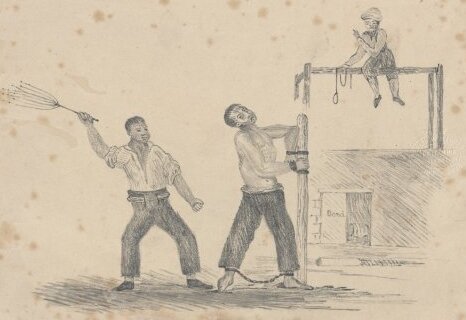Van Diemen's Doctors

The history of medicine in Australia’s penal colony days reads like something of a horror story.
The history of medicine in Australia’s penal colony days reads like something of a horror story. For any storyteller writing a campaign set in a harsh frontier or a colonial era, Australian history is a must-read, and while pretty much every aspect of society from that time illustrates the ways in which things can go terribly wrong, the history of its physicians paints an especially hilarious bleak view of frontier life. I had the fun of reading through a few different articles and texts for today, but if you only want to glance through one document to inspire you to write a truly horrible medical system, I recommend this one, as it describes conditions, not merely in the colonies, but among some of the worst and most extreme conditions, which always make better story fodder than more tame versions.
The problems with early Australian medical care began from the very first principles. When the time came to send physicians to care for the colonist population, the British had two pools to choose from. First, they offered moderately generous compensation packages to navy surgeons to remain in the penal colony. When this failed to attract sufficient candidates, they chose discredited or unlicensed physicians from England and from among the convicts themselves. Some convicts were offered pardons for their crimes on the condition that they remain in the colonies and practice, while for physicians who had lost their licenses to practice at home, the penal colonies offered an opportunity to work again with minimal oversight. There are some records to indicate that, just as shipfuls of women had been arrested in England on thin pretexts when the colonies didn’t have enough women, when the need for physicians in Van Diemen's Land became too great, British officials began to find convenient reasons to arrest physicians for sentencing and transport. The quality of the candidates tended to be poor; records from the early 1800’s state that most of the physicians on the convict ships were “either students from the lecture room or men who failed in their profession and had taken to drink.”
Many of the physicians who did end up in the colonies were allegedly “incompetent, ignorant, irritable and violent,” with records of the time accusing some of the highest-ranking doctors as being totally lacking in even basic knowledge and skill. It was, indeed, an influx of Scottish physicians, who had difficulty obtaining work in England, which reportedly led to an improvement in overall medical care in Australia and Tasmania. Even so, when the Scottish doctors’ called for the creation of a local college of physicians to ensure that practitioners had basic credentials, the local government procrastinated for years, deeming such things not to be priorities.
Since they were among the non-convict residents of the colonies, as well as ostensibly being among the most educated, doctors often had many and varied duties to the people. Some of these were only tangentially related to healing, if at all. For example, surgeons were expected to be able to stand in for local clerics as needed, giving sermons in the church. More commonly, the physicians’ chief job was to ensure that the convicts in the labour gangs were able to work. Official documents state that it was the doctor’s duty to ensure that prisoners were in a fit physical state to survive 100 lashes (whippings which were, incidentally, delivered with a Cat o' nine tails with jagged metal woven into the cords), and to ensure that they would be back to work the next day. They had to keep convicts healthy in the face of the deadly environment, rampant malnutrition, and of course, murder (and sometimes cannibalism) by other convicts.
Australia’s history is a particularly terrible example of colonial life, and it’s easy to find records of how things functioned better in other colonies in history… and indeed, in almost every other colony in history. Australia’s history can help inspire storytellers as to how things can go wrong in colonies where the parent government truly doesn’t care what happens to anyone there, where the local government is corrupt, and where the healers, among others, may be incompetent, or be there against their will entirely. It makes for a very different story than the heroic pride of North American settlement tales or the laid-back criminality of Caribbean colonization. These contrasts are the stuff of some very cool plot hooks that players won’t soon forget.
More than four years ago, Dr. Eris Lis, M.D., began writing a series of brilliant and informative posts on RPGs through the eyes of a medical professional, and this is the one that appeared here on March 5, 2016. Lis is a physician, gamer, and author of the Skirmisher Publishing LLC OGL sourcebook Insults & Injuries, which is also available for the Pathfinder RPG system.





